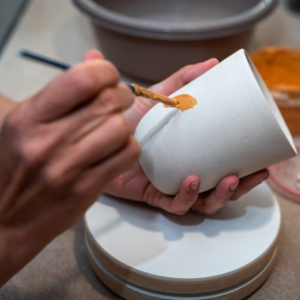Bonding Activities for Foster Children: Building Trust Through Quality Time Together
Tuesday 15 July 2025
Welcoming a foster child into your home can be a profoundly transformative experience. As you settle into your new family life, you may find yourself looking for meaningful ways to bond and build trust.
One of the most effective ways to build trust and nurture your new relationship is by spending time together. It can be as simple as going shopping together and giving them the opportunity to share what foods they like or letting them pick the film for a cosy movie night. Moments like this create shared joy and are an opportunity for you to help them feel seen, heard and valued as a member of your family.
Here are some other ways you can engage and spend quality time with each other:
1. Explore the outdoors

Heading outside to explore your local parks or going for a bike ride is a great way to ease stress and enjoy some peaceful, quality time together. Spending time outdoors not only helps clear your mind and regulate your emotions, helping you feel more grounded, but it also creates opportunities for you to bond in a more relaxed setting.
Here are some fun activities you can do together:
Hiking or nature walks – Let the child lead the way and explore. You can also write a checklist of items to collect or take pictures as you walk. Maybe try finding colourful flowers, leaves, birds and squirrels.
Picnics – Make and pack a picnic together. You can also include fun surprises to be discovered later, like their favourite snack, bubbles, or storybook.
Visit a community farm or zoo – Explore and learn about the animals; you can feed their curiosity while you feed the goats.
2. Get creative
 Creative activities encourage children to express themselves in a way that allows them to have fun and let go. Keep it simple and pressure free, let them get messy – children are messy and that’s ok!
Creative activities encourage children to express themselves in a way that allows them to have fun and let go. Keep it simple and pressure free, let them get messy – children are messy and that’s ok!
Here are some fun ways you can get a little creative and messy together:
Painting – Give them some paint and see what they create. You can create a folder with all their artwork or display it at home.
Colouring – Colouring in helps spark their imagination and you can help spark their imagination with prompts. Try something like “What colour should we colour in the tree?” or “Should we draw a picture of what we did today”.
Modelling – Clay can be a messy, fun, sensory and immersive experience. Modelling is a great way to encourage your foster child to use their imagination and promote collaboration and communication by working together. This is an activity that you can do at home, or you can go to a local pottery painting studio, making it more of a day out that ends with a souvenir of your day out together.
3. Big cook, little cook
 Working together and doing activities like cooking together is a pressure free way to bond with your foster child. It will help build their confidence and cooperation skills and give them the space to open up to you. Choose a simple recipe and go buy the ingredients together. This will help them feel more involved in the family’s decisions and like their opinions matter.
Working together and doing activities like cooking together is a pressure free way to bond with your foster child. It will help build their confidence and cooperation skills and give them the space to open up to you. Choose a simple recipe and go buy the ingredients together. This will help them feel more involved in the family’s decisions and like their opinions matter.
Pizza making party – Let them pick and place the toppings. Talk about your day or play some music, make it a full sensory experience.
Bake – Bake a cake or decorate cupcakes together. It’s fun and creative with a sweet reward.
Include them in your daily or weekly routine – You could make pancakes together on a Sunday morning. Or something as simple as setting the table and making smoothies together is a great way to help your foster child become part of the family. Creating positive associations around food can be very comforting. Consistency is important, when a child knows what to expect each day, it alleviates the fear of the unknown.
4. Storytelling time and reading together
 Books can help open up a whole new world. You can travel the world together as you explore new and exciting places through the world of books. Opening up a world of imagination can help children escape or understand their own stories. And reading every day can help improve both language skills and emotional intelligence in young children.
Books can help open up a whole new world. You can travel the world together as you explore new and exciting places through the world of books. Opening up a world of imagination can help children escape or understand their own stories. And reading every day can help improve both language skills and emotional intelligence in young children.
Go to the library together – Let them choose books that they like, let them loose in the library so they can explore. Libraries also often offer events throughout the week that you and your foster child may be able to enjoy together.
Read together before bedtime – Let go and be a little silly, let them read the book back to you. Let them choose the book each night, adding this to your nightly routine will help encourage independence and choice from a young age.
Storytelling games – Change the ending of their favourite books or take turns making up stories. Pick a location or subject and make it up as you go along – create a new world just for you and your foster child to explore.
5. Encourage connection through play
 Games are a great ice breaker and provide a light-hearted way to interact, bond and build social skills. Here are some fun and inclusive games that encourage teamwork and communication:
Games are a great ice breaker and provide a light-hearted way to interact, bond and build social skills. Here are some fun and inclusive games that encourage teamwork and communication:
Board games – Board games encourage teamwork and are a great way to work together towards a shared goal.
Family game night – Dedicate a night for the family to get together and play games together. Make a fun evening of it by having the family’s favourite foods, playing music and picking a different game for each week.
Age-appropriate console games (Xbox/PS5/Switch) – Console games are great way to get the whole family involved! But it’s important to choose games that are age appropriate, and encourage your family to work together.
6. Build a weekly routine
 Having a routine helps build trust, whether that’s a weekly family game night or set times for meals, consistent shared experiences can help children feel safe and cared for. Include them and encourage them to add or create a routine that suits their needs. Help them feel included, giving them a sense of control and empowering them to make their own decisions.
Having a routine helps build trust, whether that’s a weekly family game night or set times for meals, consistent shared experiences can help children feel safe and cared for. Include them and encourage them to add or create a routine that suits their needs. Help them feel included, giving them a sense of control and empowering them to make their own decisions.
Bedtime routine – Having a consistent nighttime routine that includes having a bath, picking out PJ’s and reading a book before bed will help your foster child feel secure in knowing what to expect each night.
Chores – Encouraging your foster child to help with simple chores like setting the table each day or making their bed will help build a sense of responsibility and belonging.
Weekly Activities – Including weekly activities like “family game night” or “Sunday pancake breakfasts” gives your foster child something to look forward to each week and will help you build connection and memories together.
Every child is unique and what works for one may not work for another. The most important thing you can do for a child is show interest, patience and openness. It is about being present when creating new memories together and offering consistency. Even small activities like walking to school in the morning, when done with love, can have a big impact on a child.
So, whether you’re baking cupcakes, reading or simply walking together in the park, you are doing something profound just by being there in those moments.
You are building trust and connection – one moment at a time.
